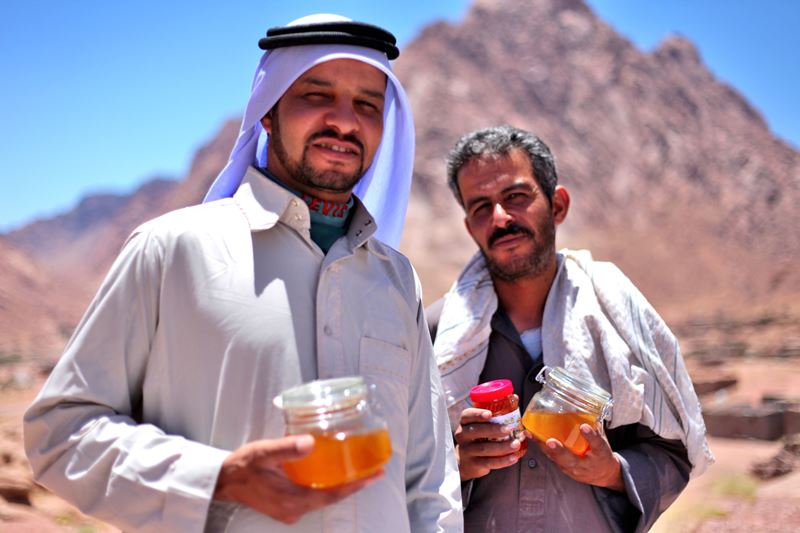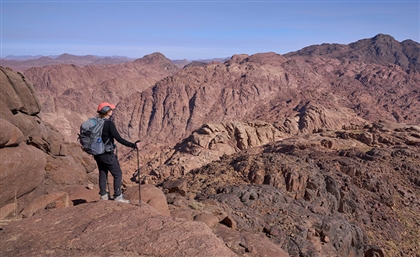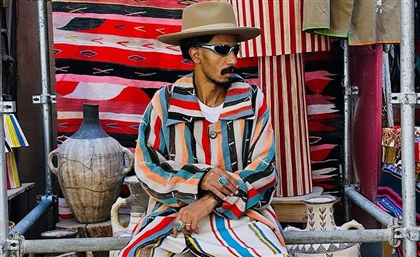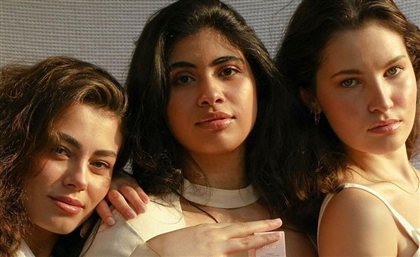St. Katherine's Honey: Sinai's Sweet Spot
Uncovering the true beauty of Sinai's unique ecology and providing the Bedouin community with a safe and profitable business model, eco-entrepreneur Amr Bassiouny speaks to Dalia Awad about the 100% organic, sustainable honey that's just hit stores.

As the hustle and bustle of Cairo remains the epicentre of Egypt’s developments, the media will have you believe that there’s not much going on outside of the city victorious. But the fact of the matter is, there are hundreds of young, Egyptian go-getters with a passion for Sinai and the marvels the peninsula holds. Choosing to swap the city for the awe-inspiring sea, mountains and culture of the region that politicians consider nothing more than a problem, one such man is eco-entrepreneur Amr Bassiouny who, on the back of several social projects he’s been involved with in Sinai, is now working with the Bedouins, bees and wild herbs to provide the economically ailing community with a new source of income; one that is unique to their region and is safe, profitable and sustainable.
With tourism in Egypt hitting all-time lows, and South Sinai particularly affected by the unrelated violence happening in the north of the region, the need for the Bedouins to find alternative sources of income has never been so urgent. Due to geopolitics and cultural differences, developing the region to create bona fide jobs for these communities just doesn’t make sense, while longstanding social stigmas means neither the government nor businesses are willing to invest, anyway. That’s why Amr Bassiouny and his colleagues see the need for social projects to bolster incomes and create dialogue, instead of financial ones; projects born of the culture, climate and environment of Sinai. So why honey? “St. Katherine’s mountain honey is a hidden gem in Egypt, a truly world class product that very few have ever seen or tasted. The valleys surrounding the small town are lined with unique wild medicinal herbs growing naturally,” says Bassiouny. The bees feed on these herbs’ nectar and produce a honey like no other, both in terms of taste and medicinal value. More importantly, the wild herbs that the bees feed on have never been exposed to any chemicals or fertilisers, and are as organic as nature can create. “These are not beehives in the city of St. Katherine, but ones in remote areas that are accessed only by 4x4s or camels,” Bassiouny adds, explaining the rarity of honey being harvested in Egypt’s backyard.

“People in Egypt understand honey, and they appreciate it and understand its benefits,” says Bassiouny about the commercial viability of their productions, and a food that is older than time itself, mentioned in many a holy text. “However, the difference between commercial grade and medicinal grade honey is very big, and having better quality honey can lead to great improvements in health and can also be used to treat wounds and burns.” Bassiouny, along with his local Bedouin partner Badri Goma’a, is working closely with one of the Sinai’s most experienced beekeepers, Salem Saleh, ensuring that the whole project – and its profits – remains in the hands of the community that fuel it. The Bedouin community are, after all, not only the beekeepers, but the gatekeepers of the bountiful region we are only recently truly uncovering.

“The beehives are made from natural wooden frames and placed in remote areas in the St. Katherine valleys such as Wadi El Arbaeen,” Bassiouny explains before going on to describe the production process in detail. “There are three harvest seasons per year, and once it’s ready, the honeycombs are removed from the beehives and sent to a manual centrifuge where the honey is gently removed from the combs and left to sit until the lighter particles such as the wax float up to the top. A drain is then opened from the bottom and the honey is stored in jars in a cool and dark place until it is sold.” This pure approach to the process, directly from the honeycomb to the jar, sets the final product apart from its commercial counterparts which are often tampered with through pasteurisation, heating and filtration. The result? Pure, top grade, 100% organic Sinai honey.

It is important to distinguish where this product comes from, not only because of the positive financial and social repercussions this project can have, but in terms of Sinai’s unique ecological system. Globally, there’s been a decline in bee population, but St. Katherine remains relatively immune to the epidemic. “Disease and pesticides are responsible for decimating bee populations around the world, but these problems do not exist in the valleys. These areas, and the plants that inhabit them, only see pure water and sunshine,” Bassiouny reiterates, though that doesn’t mean the project is not without its challenges. “Keeping the hives alive can still be quite problematic as there are very active hornet/wasp populations during the summer that can completely destroy complete hives and kill all the bees. This is one of the reasons why the price can be higher, as there is a much higher rate of loss to wasps.” Another issue affecting honey production in St. Katherine are the low temperatures often witnessed in the winter. This can be remedied, however, by moving the hives to lower altitudes during the colder months.
The Sinai region, however, remains a contentious one – one the media will have you believe offers nothing but weapons, drugs and separatist rebels. But it’s precisely for this reason why a project like this is needed, and needed now. “This project is being done so that the local Bedouins can make most of the money and realise the true market value of their superior produce, which they deserve as they are making most of the effort and own this amazing product. It is much more profitable than working in tourism and has the potential to employ a very large amount of people if the honey is marketed internationally and production can be grown significantly,” says Bassiouny. Though it’s still a very small operation, he’s sure that as it picks up, it can change the lives of those involved and have a considerable ripple across the community. “I can confidently say that having a well-managed beehive is less work and more income than a marijuana or opium farm, as is commonly found there, and it’s also more profitable than working as a tour guide,” he says.

Anyone who knows honey, knows that there are prized rare varieties that sell for thousands. “Mountain honey from Yemen can go for up to 4,000 EGP per kilogram,” says Bassiouny, and Turkey recently made headlines for producing the world’s most expensive honey at $6,800 (nearly 50,000 EGP) per kilogram. “St. Katherine’s mountain honey smells and tastes better than most of the Yemeni types I have tried and is very competitive. I believe much more value can be captured as it becomes better known in the world market.” Recently, honey produced by one of the Bedouin beekeepers currently working on this project was entered into an Italian competition and blew the judges away, garnering the lion’s share of the vote for warm, fruity aroma, and unique nutritional properties. The Bedouin beekeepers recommend starting your day with a tablespoon of the honey in a glass of hot water to get the most of the medicinal effects

As production and packaging continues, people across Egypt are a-buzz about St. Katherine’s honey, and Bassiouny has already been approached by foodies eager to get their first taste of Sinai’s elixir. The product has just hit shelves of inSeason in Zamalek, so you can get the first taste of the top notch honey now. Currently in talks with some well-known national supermarket chains, and with the community at St. Katherine eager to participate, the future certainly looks sweet for this unique venture.
Main image courtesy of Abir Yehia.
- Previous Article Dr.Sisilove or How (Not) To Diffuse A Bomb
- Next Article What's in a Name?
Trending This Week
-
Apr 13, 2024
























